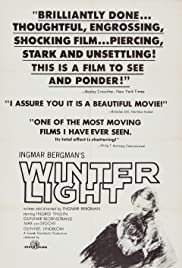
WINTER LIGHT
Sweden, 1962, 80 minutes, Black and white.
Ingrid Thulin, Gunner Bjornstrand, Max von Sydow, Gunnel Lindblom, Allan Edwall.
Directed by Ingmar Bergman.
Winter Light is an absorbing but grim film written and directed by Ingmar Bergman in the early '60s. Bergman had made an impact in Swedish cinema and world cinema in the '50s with such films as The Seventh Seal, Wild Strawberries, The Virgin Spring. With his own religious background and his critique of it, Bergman used Christian symbolism to explore society and the human psyche and soul.
In the early '60s he made a trilogy on the silence, and even the absence, of God: Through a Glass Darkly, the present film and The Silence. The film focuses on a pastor and his doubts. The religious symbolism and ritual is quite explicit. The doubts of the pastor are compared with the doubts of the ordinary man played by Max von Sydow. He is depressed (echoing the atmosphere of the early '60s) by the possibility of the Chinese having a nuclear bomb and exploding it. This character is so depressed that he ultimately suicides.
The significance of the world situation, peace and war is highlighted in the context of an exploration of religion and religious doubts. Bergman assembles the regular stars of so many of his films at the time and, with Sven Nykvist’s bleak but luminous photography, he has portrayed the religious questions of the 20th. century - and used explicitly Christian terms for questions and exploration.
1. The significance of the title, the atmosphere of winter and its symbolic significance, the symbolism of light and its penetration into winter, the winter of a man's life?
2. The location photography, the black and white photography, the music? The atmosphere of winter, the light and darkness of the day? The importance of the one-day structure of the film? Its formal structure, the audience entering into this day and living it with the minister? The importance of beginning and ending the film with scriptural and liturgical texts, the ending with, the holiness and glory of God?
3. The initial impact of the ceremony? The film spent ten minutes of its eighty on the initial ceremony. What did this mean, impact? The details of the minister's work, his religious attitudes, his temptation to irreligion? The church, the atmosphere, the emptiness of the church? The people who were there? Marta, the sexton, the few members of the congregation? Their prayer, their communion? Mr. and Mrs. Persson?
4. The focus of the film on Thomas, his winter, the need for light? The continued emphasis on his face and its anguish, the use of close-ups? The nature of his suffering, the nature of his doubts? The importance of filling in his background, his work as a minister, his dead wife, his relationship with Marta and its effect?
5. The atmosphere of ceremony throughout the film? The highlighting of prayer and the lack of it throughout the film? What kind of God was revealed during this film? A middle-aged man's God and his absence? The significance of the silence of God for all the characters?
6. The importance of Jonas Persson and his wife? Their doubts, their suffering, their seeking help from the pastor? The sexton and his attitude towards suffering, his physical look, his puzzling about the mystery of Christ? The various other people at the ceremony, their singing, yawning, fidgeting?
7. The sequences where Thomas communicated with the warden and his gossip? The sexton and his brusqueness, but the discussion later in the afternoon about Christ? The importance of this discussion and the light that it threw on Thomas? The communication between Persson and his wife? The reality and unreality of his fear about the bomb, the Chinese? How were these symbols of his despair? His inability to cope, his wife and her inability to help? The nature of this despair and its fatal aspects?
8. The focus on Marta? Her role in the village, her relationship to Thomas, her devotion to him and its gratifying aspects and his irritation? The significance of the letter? . Its length, the content, the technique of its communication? What did it reveal about their relationship? The needs of each? The light that was needed and given? The significance of Marta's suffering? The eczema, her prayer? Her wanting a miracle? His objecting to her love, yet his dependence on her?
9. The importance of the news that Persson had killed himself? The effect on Thomas? The silence of God? His sense of utter helplessness?
10. Marta and the atmosphere of illness, her being in the church, her clinging to Thomas, the impact of the news of the death?
11. What happened to them when they went to the scene of the accident? What could they do? Prayer? Comfort? The importance of the story that Thomas told while they waited for the train to go by? What did it reveal about him and his needs?
12. The scene at the school house, the encounter with the new little boy and the change of atmosphere? The brutality of Thomas' telling the truth? His awareness of an unloving self, and the silence of God?
13. The sequence of communication between Thomas and Persson's wife after the man's death?
14. How did the discussion between the sexton and Thomas about Christ's suffering throw some light on the significance and the symbolism of the people's lives?
15. Thomas and his unwillingness to do the evening ceremony? What was left? The resolution to go out and to do his job in a kind of blind faith? The significance of the final prayer on his lips, given what had preceded?
16. Ingmar Bergman's contribution, the revelation of Bergman and his attitude and imagination via this film?